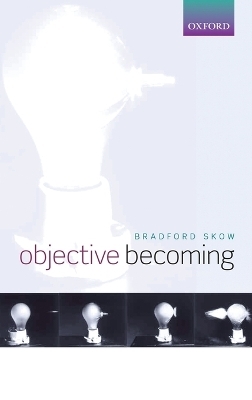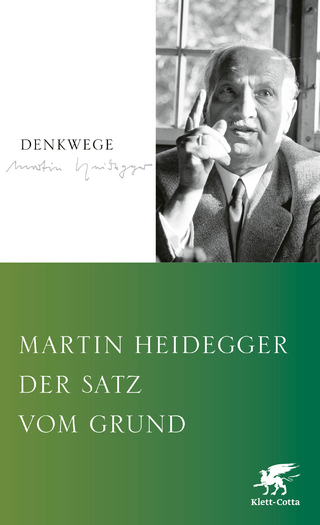
Objective Becoming
Seiten
2015
Oxford University Press (Verlag)
978-0-19-871327-2 (ISBN)
Oxford University Press (Verlag)
978-0-19-871327-2 (ISBN)
Bradford Skow presents an original defense of the 'block universe' theory of time, often said to be a theory according to which time does not pass. He provides in-depth discussions of alternative theories, reconciles objective becoming with relativistic physics, and re-evaluates our 'experience' of the passage of time in relation to the argument.
What does the passage of time consist in? There are some suggestive metaphors. âEvents approach us, pass us, and recede from us, like sticks and leaves floating on the river of time.â âWe are moving from the past into the future, like ships sailing into an unknown ocean.â There is surely something right and deep about these metaphors. But how close are they to the literal truth? In this book Bradford Skow argues that they are far from the literal truth. Skowâs argument takes the form of a defense of the block universe theory of time, a theory that, in many ways, treats time as a dimension of reality that closely resembles the three dimensions of space.
Opposed to the block universe theory of time are theories that take the metaphors more seriously: presentism, the moving spotlight theory, the growing block theory, and the branching time theory. These are theories of ârobustâ passage of time, or âobjective becoming.â Skow argues that the best of these theories, the block universe theoryâs most worthy opponent, is the moving spotlight theory, the theory that says that âpresentnessâ moves along the series of times from the past into the future. Skow defends the moving spotlight theory against the objection that it is inconsistent, and the objection that it cannot answer the question of how fast time passes. He also defends it against the objection that it is incompatible with Einsteinâs theory of relativity. Skow proposes several ways in which the moving spotlight theory may be made compatible with the theory of relativity.
Still, this book is ultimately a defense of the block universe theory, not of the moving spotlight theory. Skow holds that the best arguments against the block universe theory, and for the moving spotlight theory, start from the idea that, somehow, the passage of time is given to us in experience. Skow discusses several different arguments that start from this idea, and argues that they all fail.
What does the passage of time consist in? There are some suggestive metaphors. âEvents approach us, pass us, and recede from us, like sticks and leaves floating on the river of time.â âWe are moving from the past into the future, like ships sailing into an unknown ocean.â There is surely something right and deep about these metaphors. But how close are they to the literal truth? In this book Bradford Skow argues that they are far from the literal truth. Skowâs argument takes the form of a defense of the block universe theory of time, a theory that, in many ways, treats time as a dimension of reality that closely resembles the three dimensions of space.
Opposed to the block universe theory of time are theories that take the metaphors more seriously: presentism, the moving spotlight theory, the growing block theory, and the branching time theory. These are theories of ârobustâ passage of time, or âobjective becoming.â Skow argues that the best of these theories, the block universe theoryâs most worthy opponent, is the moving spotlight theory, the theory that says that âpresentnessâ moves along the series of times from the past into the future. Skow defends the moving spotlight theory against the objection that it is inconsistent, and the objection that it cannot answer the question of how fast time passes. He also defends it against the objection that it is incompatible with Einsteinâs theory of relativity. Skow proposes several ways in which the moving spotlight theory may be made compatible with the theory of relativity.
Still, this book is ultimately a defense of the block universe theory, not of the moving spotlight theory. Skow holds that the best arguments against the block universe theory, and for the moving spotlight theory, start from the idea that, somehow, the passage of time is given to us in experience. Skow discusses several different arguments that start from this idea, and argues that they all fail.
Bradford Skow graduated from Oberlin College and earned his PhD from New York University.
1. Introduction: Time Passes? ; 2. The Block Universe ; 3. What Might Robust Passage Be? ; 4. The Moving Spotlight ; 5. Growing Blocks and Branching Times ; 6. The Moving Spotlight Theory is Consistent ; 7. How Fast Does Time Pass? ; 8. The Challenge from Relativity ; 9. Relativity and the Passage of Time ; 10. Can We Move Through Time? ; 11. Passage and Experience, I ; 12. Passage and Experience, II ; 13. Concluding Thoughts: Passage and Time-Biased Preferences ; Reference ; Index
| Verlagsort | Oxford |
|---|---|
| Sprache | englisch |
| Maße | 162 x 240 mm |
| Gewicht | 560 g |
| Themenwelt | Geisteswissenschaften ► Philosophie ► Metaphysik / Ontologie |
| Naturwissenschaften ► Physik / Astronomie ► Relativitätstheorie | |
| ISBN-10 | 0-19-871327-4 / 0198713274 |
| ISBN-13 | 978-0-19-871327-2 / 9780198713272 |
| Zustand | Neuware |
| Haben Sie eine Frage zum Produkt? |
Mehr entdecken
aus dem Bereich
aus dem Bereich
Buch | Hardcover (2024)
Matthes & Seitz (Verlag)
CHF 41,90


